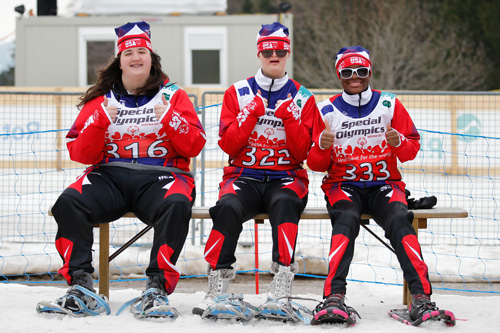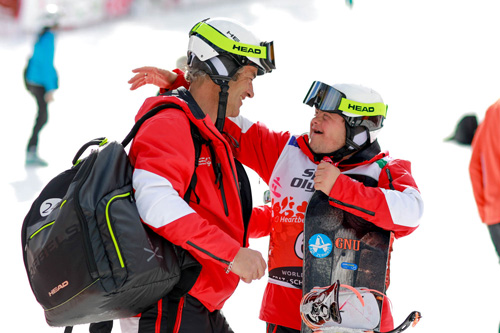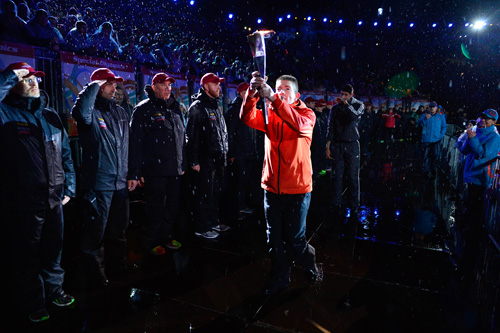The Global Search for Education: The Power of Sports to Disrupt Disability

“I hope Special Olympics will inspire others with developmental disabilities to have confidence in themselves. Often, these people feel marginalized and unworthy and there is no longer a need for us to hide in the shadows.” – Billy Seide
Raising awareness about the potential of people with intellectual disabilities has been a primary focus of the Special Olympics.
Billy Seide has been participating in the Special Olympics since 1999. In 2007, he went to Shanghai in China for the Special Olympics world summer games in softball, and his team earned 3rd place. In 2016, he switched to The Sound Shore Stars because it was closer to where he lived. Currently he helps out and participates in floor hockey, basketball, swimming, unified bowling, track and field, and the pentathlon.
Professor William P. Alford is Lead Director and Chair of the Executive Committee of the Board of Directors of Special Olympics International, which serves individuals with intellectual disabilities in more than 170 jurisdictions around the world. In 2004, Alford helped found the Harvard Law School Project on Disability (HPOD). He describes the organization’s goals, noting they are “to be of assistance as the UN drafted the Convention on the Rights of Persons with Disabilities” and to be “a resource about disability law and policy both in nations that have ratified the Convention and beyond.”
The Global Search for Education welcomed Professor William Alford and Billy Seide to talk about the power of sports to disrupt disability.

“The skills and competencies that I have acquired with Special Olympics help prepare me to meet with other athletes whom I wouldn’t otherwise get to know. With the coach’s guidance, I learn how to speak in front of others.” – Billy Seide
Billy, what has being part of the Special Olympics meant to you?
The skills and competencies that I have acquired with Special Olympics help prepare me to meet with other athletes whom I wouldn’t otherwise get to know. With the coach’s guidance, I learn how to speak in front of others. All of this helps me to gain pride and confidence along with a belief that I actually have something to offer to others.
What would you call your most significant achievement so far?
My most significant achievement as a special olympic athlete is being a member of “The Athletes Congress”. This is an important role. Here I meet with other individuals across New York state and we discuss how to be leaders within this special community.
Prof Alford, please share your best examples of where HPOD Disability strategies have promoted the inclusion of persons with disabilities in classrooms and in the work place, both internationally and at home in the U.S. What are you focused on next?
To date, we have worked extensively in more than a dozen nations while advising in more than 30 others of the 177 nations that have ratified the Convention. The United States, has not ratified – which is unfortunate, since the Convention is modelled in important part after our own Americans with Disabilities Act, would not impose unwanted obligations on us, and already is helping improve the situation for Americans with disabilities working or travelling abroad, not to mention hundreds of millions of other nationals.
The work our Harvard Law School Project on Disability does varies enormously from setting to setting, as we think it critical that our approach in any country be shaped by history and context, and take serious account of the views of the local partners, even as we draw upon comparative law in providing a range of approaches. As a consequence, in addition to our own scholarly research, we have advised on the drafting of education, employment, health, anti-discrimination law and more; assisted in the formulation of state policy; collaborated on impact litigation; helped develop texts and teaching materials introducing disability law into university curricula; taught persons with disabilities how to advocate for themselves with educators and officials; formed family support groups; trained personnel in disabled persons organizations; and produced an array of materials– including simplified introductions to the CRPD for persons with intellectual disabilities in a half dozen major languages; print and internet profiles of both the accomplishments of persons with disabilities as well as the on-going challenges they face; and a Chinese language manual, using examples from both domestic and foreign companies, illustrating advantages of employing persons with disabilities. Our efforts encompass all types of disability.
We are delighted that many of our students at Harvard have chosen to join us in this work and also that we have been able to bring to the school many individuals with disabilities who have generously shared with our students their life experience.

“I would hope that we can expand our efforts to show the world the courage, the ingenuity, the determination, the humor, the comradeship, the musical gifts, and much more that our athletes manifest.” – William P. Alford
The Special Olympics has sent a powerful message of hope to the world about persons with disabilities. What do you believe should be the next important goals for this program?
Special Olympics is now celebrating its 50th anniversary. It was founded in the summer of 1968 by Eunice Kennedy Shriver, the President’s sister, out of the conviction that everyone deserves to be treated with dignity and that sports can provide a powerful engine for promoting that end, while also having many ancillary benefits. The movement, as we like to call it, has grown enormously since then, owing to the inspired leadership of Dr. Timothy Shriver, an extraordinary team of dedicated professionals, thousands of volunteers generous with their time and financial assistance, and, most importantly, the passionate engagement of more than 6,000,000 athletes around the world including more than 5,000,000 of whom are persons with an intellectual or developmental disability.
Today, Special Olympics has programs in over 170 nations across the world. Literally, every day there are hundreds of sporting events occurring globally under its auspices. But alongside our sports programming, Special Olympics also now offers health programs, promotes research regarding intellectual disability, fosters unified school programs that bring together persons with and without an intellectual disability to study and play together, and works assiduously to end stigma, to educate the world about the talents of our athletes, and to foster genuine inclusion for the good of all of us.
As the Lead Director of the Special Olympics international board (though I am speaking now in my personal capacity only, rather than for the organization), I would love to see a couple of things. First, I would hope that we can expand our efforts to show the world the courage, the ingenuity, the determination, the humor, the comradeship, the musical gifts, and much more that our athletes manifest. That demonstrates what our athletes can do (rather than what they can’t do) and also how they contribute valuably to the world. Second, I would love for us to be even more inclusive – to share our programs further with individuals from disadvantaged communities. And third, to expand our efforts in developing nations.
Billy, Looking ahead to the future – what do you predict or hope the Special Olympics will do for other kids or adults with disabilities?
I hope Special Olympics will inspire others with developmental disabilities to have confidence in themselves. Often, these people feel marginalized and unworthy and there is no longer a need for us to hide in the shadows. We definitely have something to contribute. The next way Special Olympics can innovate this important work is by educating the public. Generally, they are misinformed and fearful of these athletes, as though a developmental disability is easily transmitted to others, and something to be pitied. These beliefs are based solely on ignorance.
(David Wine contributed to this Article. All photos are courtesy of Special Olympics)
C. M. Rubin, William Alford, Billy Seide
Thank you to our 800 plus global contributors, teachers, entrepreneurs, researchers, business leaders, students and thought leaders from every domain for sharing your perspectives on the future of learning with The Global Search for Education each month.
C. M. Rubin (Cathy) is the Founder of CMRubinWorld, an online publishing company focused on the future of global learning and the co-founder of Planet Classroom. She is the author of three best-selling books and two widely read online series. Rubin received 3 Upton Sinclair Awards for “The Global Search for Education”. The series which advocates for all learners was launched in 2010 and brings together distinguished thought leaders from around the world to explore the key education issues faced by nations.
Follow C. M. Rubin on Twitter: www.twitter.com/@cmrubinworld
Source: The Global Search for Education: The Power of Sports to Disrupt Disability


















